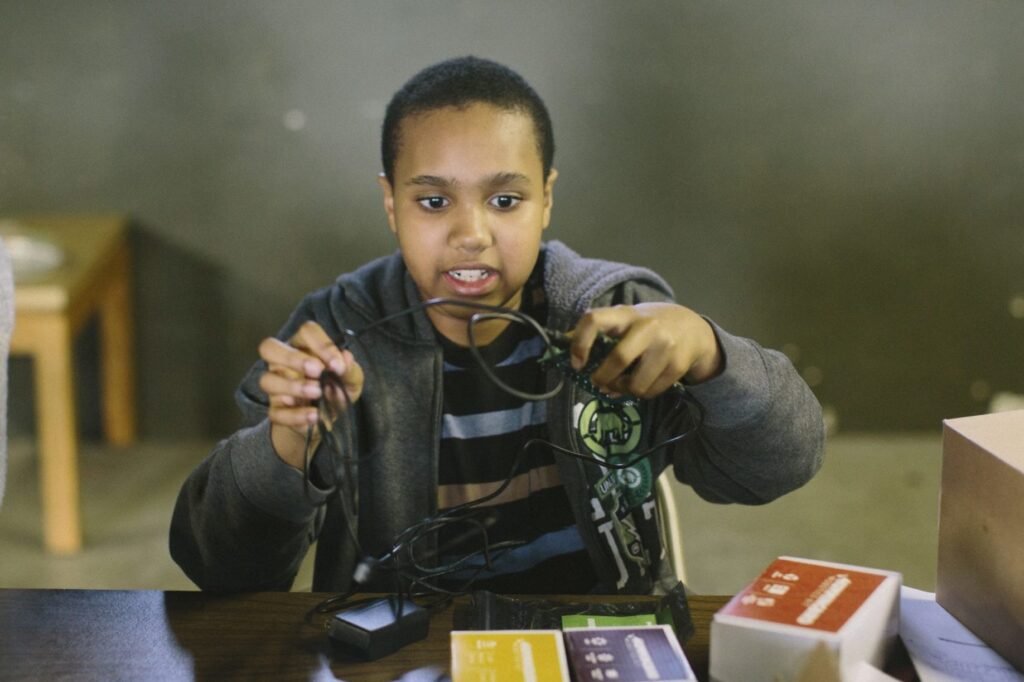One of education’s favorite acronyms will soon celebrate a big birthday. In less than a year, STEM will turn 20!
They’re four small letters that encompass a big, integrated approach to learning, workforce development, and social innovation. The STEM we know today originated in 2001, coined by administrators at the National Science Foundation (and a definite improvement over its predecessor, “SMET”).
Like many young adults ready to say farewell to their teenage years, we’re wondering what the future holds for STEM. Of course, this cross-discipline curriculum has already evolved to include the arts, creativity, and design thinking. But what’s next?
The Remake Learning network has long embraced STEM and STEAM learning as a top priority. We know the future will demand decision-makers with a strong grasp of science, technology, engineering, and math, and even young people who aren’t destined for careers in STEM fields will need to be STEM literate. To that end, Remake Learning supports the Pittsburgh Regional STE(A)M Ecosystem, a working group that’s also a member of the National STEM Learning Ecosystem Initiative’s Community of Practice.
On March 2-4, seven members of our local STE(A)M Ecosystem traveled to San Antonio, Texas, to turn up the volume on this future-forward conversation. The delegation attended the STEM Learning Ecosystems’ Community of Practice Convening, joining educators and experts around a “Future is Here” theme. Here’s what they learned about how the future of STEM is taking shape today.
Students Will Expand the Definition of STEM
Moving forward, young people likely will (and should) take the lead in expanding STEM into areas like invention and entrepreneurship.
The convening explored this idea by hosting a moderated panel discussion with seven STEM students. They shared their perspectives on inventors, innovators, and entrepreneurs, and also gave attendees advice on supporting students along their journey.
“It was destiny. It was a lunch date. A new hand, a new friend and a new perspective on life.” How inspiring to hear from these boys what #STEM means to them. Thanks @STEMecosystems for making youth voice front and center at #STEMecosystems 2020. @STEMNext pic.twitter.com/2xvroqjaqr
— Linda Kekelis (@LindaKekelis) March 3, 2020
This helped members of the Pittsburgh STE(A)M Ecosystem begin brainstorming new projects and possibilities.
“I enjoyed learning about Invent Education as an approach to program design, which I fully plan to pull on in the design of some of our summer programming,” said Kathryn Vargas, Assistant Director of Community Recreation for the City of Pittsburgh.
As student leadership begets more student creation, it will reinforce the importance of student voice and power in STEM learning.
“It is important that [we] consider the intellectual property rights of young people as we continue to provide spaces that encourage them to create,” added Vargas. “Not only is ownership an important element to youth voice and agency, but if [young people] cannot own what they create then we are missing an important connection between learning, creating, and entrepreneurship.”
STEM will Help Build a More Just Society
Pittsburgh’s STE(A)M Ecosystem co-led a social justice session at the convening, partnering with New York City’s STEM Education Network. New York’s network has developed a Social Justice in STEM working group that supports their leadership, hosts network-wide meetings on diversity, equity, and inclusion, and serves as a platform for members to learn, share, and model social justice action. Their session gave insight into the New York network’s structure and presented easily replicable social justice-focused group activities.
Dr. @alaine_allen showing up and showing out at the @STEMecosystems conference! #pghstem pic.twitter.com/8qeD1XuzcW
— LaTrenda Leonard Sherrill, MBA (@trendabelle) March 3, 2020
“I had a lot of notes around the social justice session and how I can do a better job incorporating that topic and ideas surrounding social justice into activities,” said Christine Nguyen, STEM Director for the Boys & Girls Clubs of Western PA. “We need to find more ways to collaborate, find things we specialize in, and support each other in different areas and neighborhoods so we can provide the most for all communities.”
“People are hungry for these types of discussions,” added Dominique Briggs, Project Manager, STEM PUSH Network, University of Pittsburgh. “Inequity and social justice remain important and should stay in the forefront of our conversations when planning and making decisions.”
STEM’s Future Depends on All of Us
As with many conference delegations organized by the Remake Learning network, traveling far from home brought our group of locals closer together.
“It is amazing the amount of work that is happening in our region…every ecosystem looks different and these convenings always make me marvel at the expanse of the Pittsburgh region by comparison,” said Alison Legg, Co-Director BE STEM, PI STEM PUSH, University of Pittsburgh.
It was a pleasure representing Pittsburgh by presenting with these ladies from the NYC STEM Education Network on “Modeling Social Justice in Action in STEM Learning Ecosystems” #STEMEcosystems pic.twitter.com/ec6AX2AtI0
— Alaine Allen (@alaine_allen) March 4, 2020
Sharing their experiences helped attendees expand their reach while at the convening and strengthened local connections they can build upon once home.
“It was helpful to learn from [the locals we attended with], about the sessions that they attended and how they plan to use what they learned,” said Vargas.
“This was the first time I met the team from the University of Pittsburgh and it was wonderful to learn about their work and how they are impacting students in the region,” said Colleen Fedor, Executive Director of The Mentoring Partnership of SWPA. “As a group, we all had opportunities to work more closely together, to share resources and experiences.”
And ultimately, it is these connections that will drive the future of STEM learning forward, for educators and the young people they serve.
“It was overwhelmingly evident that relationships are a key ingredient to student engagement and success in STEM learning.”

